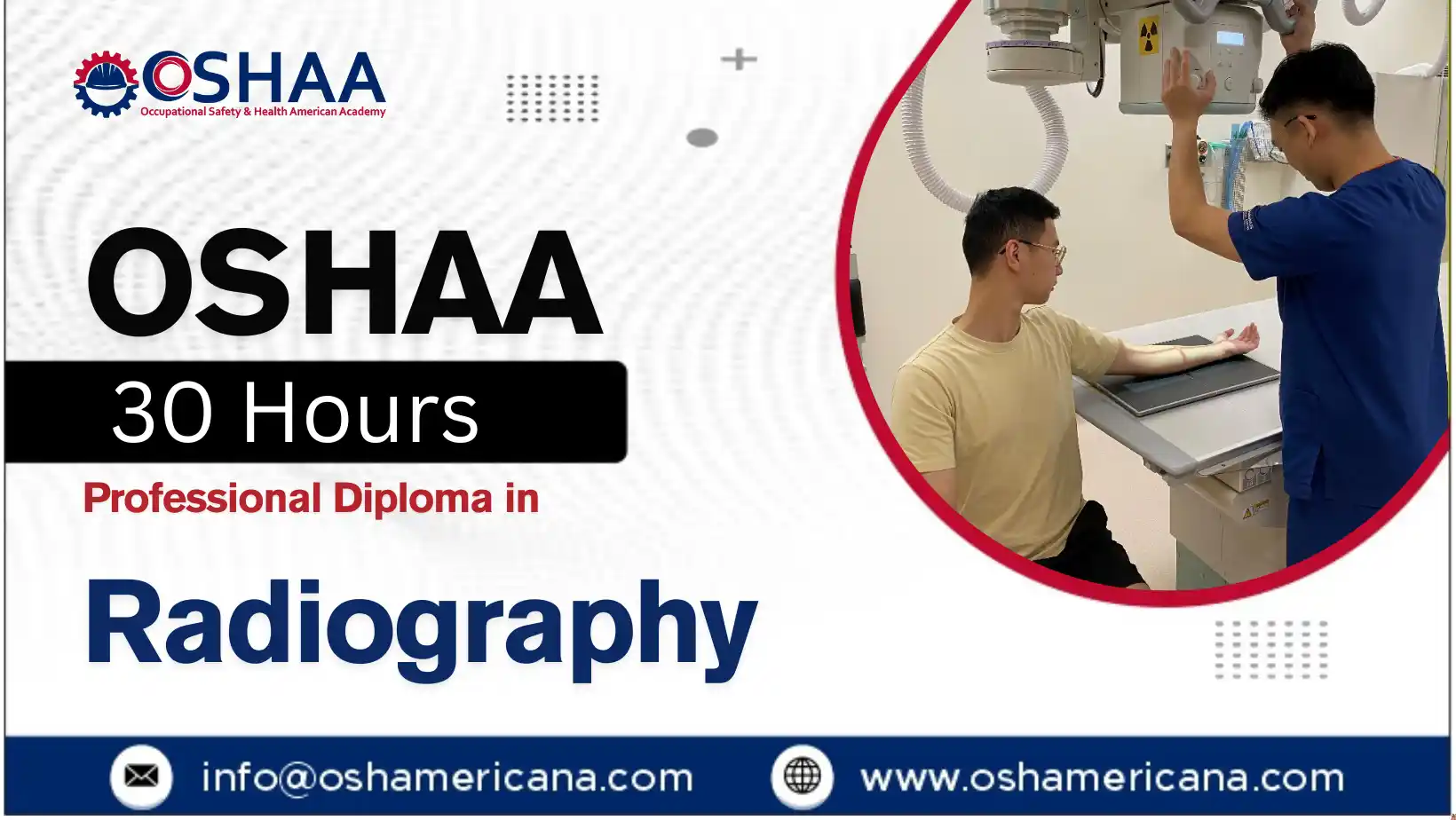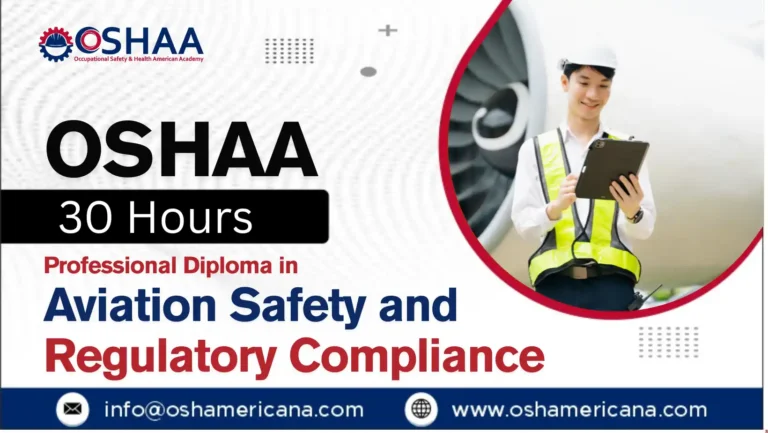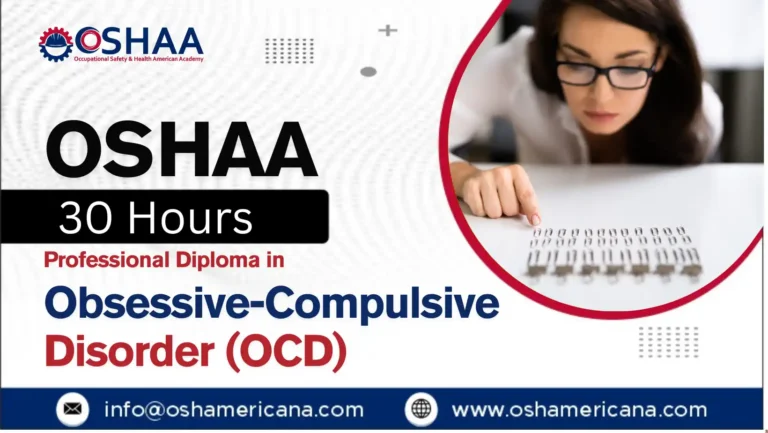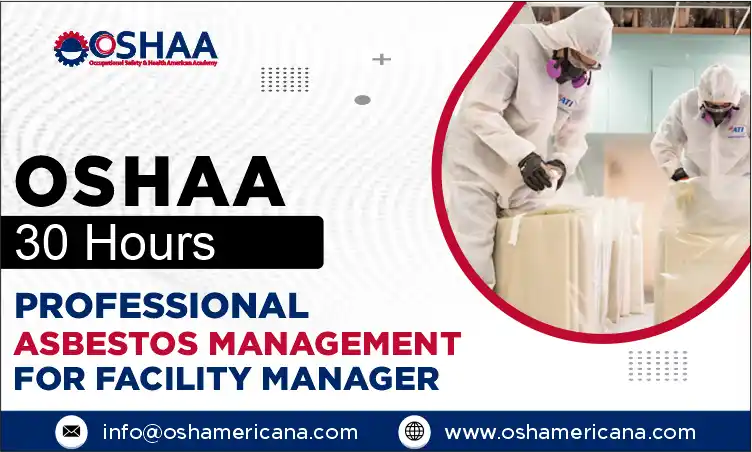Radiography is an essential component of modern healthcare, enabling medical professionals to diagnose and treat various conditions using advanced imaging technology. If you’re interested in pursuing a career in medical imaging or enhancing your skills in this field, the OSHAA 30-Hours Professional Diploma in Radiography offers a comprehensive programme designed to provide you with the foundational knowledge and practical skills required to succeed. This diploma is perfect for individuals looking to build or strengthen their career in radiography, medical imaging, and patient care.
The field of radiography is dynamic and continually evolving, with new technologies and techniques being introduced regularly. This diploma course has been crafted to provide you with an in-depth understanding of radiographic procedures, patient safety, imaging techniques, and the ethical considerations involved in medical imaging. Whether you’re starting a career in radiography or seeking to enhance your existing qualifications, this course is designed to meet your educational needs.
The OSHAA 30-Hours Professional Diploma in Radiography is an excellent starting point for anyone looking to pursue a rewarding career in medical imaging. With a focus on practical skills, patient care, and the latest advancements in technology, this course prepares you to thrive in the dynamic field of radiography.
Whether you are looking to begin your career in radiography or improve your existing knowledge and skills, this diploma will help you unlock exciting career opportunities in healthcare.
OSHAA 30-Hours Professional Diploma in Radiography
Study Units
Learning Outcomes
Introduction to Radiography and Medical Imaging (3 hours)
- Understand the role of radiography in healthcare and its importance in diagnostic medicine.
- Familiarise with different types of medical imaging technologies (X-ray, CT, MRI, ultrasound).
- Learn about the history and evolution of radiographic imaging.
- Gain an overview of the typical workflow in a radiography department.
Radiation Physics and Safety (4 hours)
- Understand the basic principles of radiation physics, including the types of radiation used in radiography.
- Learn the methods for ensuring patient and staff safety during radiographic procedures.
- Identify radiation protection standards and best practices to minimise exposure.
- Understand the significance of radiation dose management in clinical settings.
Radiographic Procedures and Techniques (4 hours)
- Gain practical knowledge of common radiographic procedures, including standard X-rays, CT scans, and MRI.
- Learn the techniques used to obtain clear and accurate images for diagnosis.
- Understand the process of preparing patients for different imaging procedures.
- Develop the ability to select appropriate imaging techniques based on clinical requirements.
Patient Positioning and Image Quality (3 hours)
- Understand the importance of proper patient positioning in obtaining high-quality radiographic images.
- Learn the different positioning techniques for various anatomical regions.
- Understand how positioning affects image clarity and diagnostic accuracy.
- Develop skills in adjusting imaging parameters to enhance image quality.
Anatomy and Physiology in Radiography (4 hours)
- Gain a solid understanding of human anatomy and physiology relevant to radiography.
- Learn to recognise key anatomical structures visible in radiographic images.
- Understand the physiological processes involved in medical imaging.
- Develop the ability to interpret images in relation to normal anatomical variations.
Patient Care and Communication (5 hours)
- Learn effective communication techniques to ensure patients are informed, comfortable, and relaxed during imaging procedures.
- Understand the importance of patient confidentiality and informed consent in radiography.
- Develop the skills to manage patient anxiety and other psychological aspects of the imaging process.
- Learn the ethical considerations of patient care and the role of the radiographer in fostering a positive patient experience.
Radiography Equipment and Technology (4 hours)
- Familiarise with the operation and maintenance of radiographic equipment such as X-ray machines, CT scanners, and MRI units.
- Learn about the latest technological advancements in radiography equipment.
- Understand the principles behind digital imaging technologies and their benefits.
- Develop troubleshooting skills for handling common issues with radiographic machines.
Ethical and Legal Considerations in Radiography (3 hours)
- Understand the ethical responsibilities of radiographers in patient care and clinical practice.
- Learn the legal requirements and guidelines governing radiographic practices, including patient consent and data privacy.
- Understand the principles of medical ethics, such as non-maleficence, beneficence, and justice.
- Familiarise with the regulatory frameworks and professional standards that ensure high-quality care in radiography.
- Comprehensive Understanding of Radiography
This course provides a well-rounded education in radiography, covering key areas such as radiation safety, patient care, imaging techniques, and the latest radiographic technologies, ensuring you gain both theoretical knowledge and practical skills. - Industry-Relevant Skills
Participants will develop practical, real-world skills required in radiography, including patient positioning, image quality enhancement, and the safe operation of imaging equipment, which are essential for working in clinical environments. - Enhanced Patient Care Expertise
The course focuses on effective communication and patient care, teaching you how to manage patient anxiety, ensure comfort, and maintain confidentiality, which are crucial skills in any healthcare setting. - Exposure to Cutting-Edge Technology
Stay up to date with advancements in radiography equipment and technology, including digital imaging, CT scanners, and MRI machines, enhancing your ability to work with the latest diagnostic tools in the medical field. - Radiation Safety Knowledge
Gain in-depth knowledge of radiation physics and safety, including methods to minimise exposure for both patients and healthcare professionals, ensuring a safe and compliant working environment. - Ethical and Legal Proficiency
The course covers ethical and legal considerations in radiography, equipping you with the knowledge of patient consent, privacy, and regulatory compliance to navigate the professional standards in medical imaging. - Career Advancement Opportunities
A qualification in radiography opens up various career paths, whether you’re looking to work in hospitals, diagnostic clinics, or private practice. It enhances your employability and makes you a valuable asset in the healthcare sector. - Boost Your Confidence in Clinical Practice
By gaining hands-on experience and comprehensive knowledge, this diploma helps build your confidence in performing radiographic procedures and interacting with patients, preparing you for practical challenges in medical imaging. - Support for Continuing Education
For those already working in healthcare, this course serves as a valuable opportunity for continued professional development, broadening your skill set and keeping you informed about the latest trends in radiography. - Recognition and Credibility
The diploma is recognised by employers in the healthcare industry, adding credibility to your professional profile and increasing your chances of securing a role in radiography or advancing in your current career.
This course provides all the essential tools and knowledge you need to pursue a successful career in radiography, positioning you as a competent and qualified professional in the healthcare industry.
The OSHAA 30-Hours Professional Diploma in Radiography is designed for a wide range of individuals interested in pursuing a career in medical imaging or enhancing their existing knowledge and skills in the field. This course is ideal for:
- Aspiring Radiographers
Individuals looking to begin their career in radiography and medical imaging, equipping them with the necessary theoretical knowledge and practical skills to work in the field. - Healthcare Professionals
Nurses, medical assistants, and other healthcare workers who want to expand their skillset and deepen their understanding of radiographic procedures, imaging technologies, and patient care. - Radiology Students
Current students or trainees in radiology who want to supplement their academic studies with hands-on experience and a deeper understanding of clinical radiographic techniques. - Medical Imaging Technicians
Those who work with imaging equipment and want to further their expertise in operating radiography machines, patient positioning, and image analysis. - Clinical Support Staff
Individuals working in healthcare settings, such as radiology departments, looking to enhance their knowledge and skills in medical imaging and patient care. - Medical Professionals Interested in Diagnostic Imaging
Doctors, clinicians, and healthcare managers who wish to gain a comprehensive understanding of radiography and its role in patient diagnosis and treatment. - Individuals Seeking Career Advancement
Healthcare professionals seeking to broaden their skillset in radiography to increase their career opportunities or move into higher-level positions within radiology departments or imaging clinics.
Whether you’re starting your journey in medical imaging or enhancing your current qualifications, the OSHAA 30-Hours Professional Diploma in Radiography will provide you with the essential skills and knowledge required to excel in the field of radiography.







